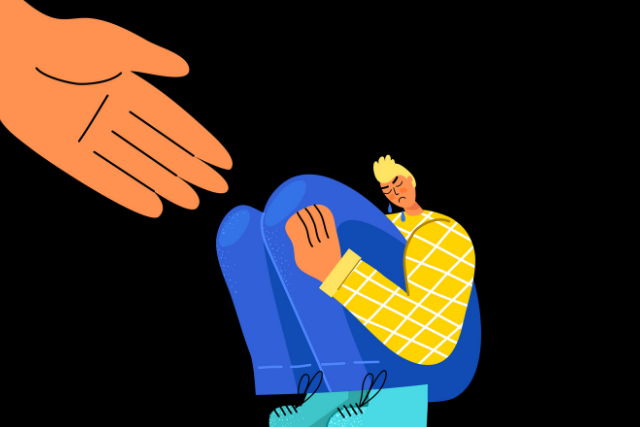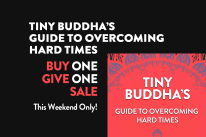
“There is no exercise better for the heart than reaching down and lifting people up.” ~John Holmes
As someone who people often come to seeking help or advice, I recently encountered a new situation for me: one in which I chose to stop helping someone and walk away entirely because I determined it wasn’t good—for the other person or myself.
It felt like the wrong thing to do, but once I had some distance, I knew I had made the right decision. Throughout the helping, I soldiered on and helped and helped and helped until it no longer felt good, and sometime after that I determined it was no longer help at all—it was enablement.
My good friend—let’s call him Jack—has had a series of extremely toxic relationships. Infidelity, dramatic and very public confrontations, drug abuse, police involvement…. Jack has always played the role of victim in these cases, and in the three relationships I saw him in during the time of our friendship, he was cheated on, dumped, thrown out of the house, and physically abused. He can’t seem to help himself in this regard.
Last year, he entered a relationship that was problematic before it even began. The very first official date with Henry, the guy who later became his partner, Henry stormed out of a dinner with a group of people, got extremely intoxicated, and got into a fist fight (with a legally blind person no less) and thrown out of another establishment later. This was all on the first date mind you!
In a sense, this was very lucky. When someone shows you their worst selves, that is often after years together, a shared home, or maybe even a marriage. At that point, it’s usually emotionally and perhaps even logistically very difficult to walk away. On date #1, not so much!
And yet, Jack persisted.
Over the course of the next few weeks, Henry, who was already living paycheck to paycheck, was fired from his new job (for which he relocated internationally) for having a shouting match with the boss, and had a dramatic fight with his older sister, who was his only acquaintance in this new country and perhaps his only source of financial support.
It also became clear the guy was an alcoholic and drug addict. Without a job or the help of his sister, who do you think he immediately turned to for money? Yup, Jack.
Before too long, Henry’s temper tantrums were directed at Jack’s friends, including myself. The first day I met him, Henry screamed and yelled at me over dinner. In short order, the temper tantrums were turned on Jack, and soon the words became closed fists. He beat up Jack a few times—once leaving Jack with a pair of black eyes—and yet, it was Henry who dumped Jack. Jack kept coming back for more!
This all unfolded over the course of about six months. During this time, Jack frequently sought my advice. Whenever we talked, I of course let him know how unacceptable Henry’s behavior was, but also tried to get Jack to accept the deeper reality of the situation—that no one who was okay with themselves would tolerate this type of behavior from someone else and that Jack needed to really work on himself.
As the situation became more threatening and then violent, I counseled Jack in no uncertain terms that it was time to get the hell out of there. Had I been aware shortly after the physically violent episodes (Jack only told me weeks after the fact), I very likely would have become directly involved and called the police.
After each of these conversations, Jack’s mood brightened from despondent to anywhere from determined to energized. He was going to take action. He was going to see a therapist. He was going to stop giving Henry money and leave him. He was going to make sure not to speak with him alone. And each time… nothing. Same story each time. Each time I saw Jack, Henry was there, often belligerent, and always intoxicated with something.
However, as incomprehensible as Jack’s behavior and decision-making seemed, it’s not uncommon for victims of abuse, who often suffer from past traumas and therefore have underlying emotional and psychological issues that require professional attention. In fact, it has a name: trauma bonding. I was aware of that, so beyond trying to help protect Jack’s physical safety, I was patient in nudging him toward seeing someone.
What finally did it for me—the last straw—was after the second or third incident of physical abuse. Jack’s friends, some of whom I knew, were very happy to gossip and complain about the situation behind Jack’s back, especially insofar as it affected their social plans. However, they didn’t intervene or offer him help in any way that I could see.
Likewise, Jack lived at home with his parents and siblings. Even after coming home black and blue and bleeding, they took no action and never discussed the situation.
A week later, there were social media postings of Jack and Henry back together again, all smiles. The friends who knew of the abuse? They awarded those posts with smiley faces, hearts, and thumbs up.
At that point, I realized that I just couldn’t fight this battle alone. It’s difficult enough to try and help someone who is not able to help themselves and indeed seems intent on hurting themselves, but when such a person’s self-destructive behavior is supported and enabled by a whole community of people surrounding them? That is an impossible situation, so I took myself out of it and broke contact. I was out of the country at the time, so it was easier to do this at that point.
I thought about why I did this. It wasn’t because Jack was so intent on his self-destructive behavior—that just made it difficult, and it’s hardly a unique circumstance. It wasn’t because it was unpleasant—helping someone who really needs it often isn’t pleasant or glamorous, however good it might feel after the fact. And it also wasn’t that I felt in danger from Henry—he was a classic bully, beating up on people weaker than he was, but I didn’t have to see him.
No, this was something else entirely. This was “toxic help,” and I thought about it and figured out three ways to identify it as such. With these conditions, it’s difficult for me to imagine any help actually being helpful, in which case it’s better for you and indeed everyone else if you extricate yourself.
3 Ways to Identify Toxic Help
1. You check yourself and don’t like what you find.
Whenever you help someone, you should always check yourself first to ensure that this help is coming from a good place, from the standpoint of both your mind and emotions.
The ego often plays a critical role in instances of toxic help. If you delve deep, you may find that you are actually pushing some agenda or subconscious ulterior motive on the other person.
For example, you may be helping in part because you are re-enacting some past trauma or mistake you made and trying to fix your past self. Or, you may be trying to impress the person or make yourself feel superior. There are a lot of ways your ego could be manipulating the situation.
In my case, I didn’t find any evidence of a subconscious ulterior motive. However, what I did find was that I had developed a lot of negative emotions around the whole situation.
I was frustrated with Jack for making the same error over and over and over again. I was angry with Jack for constantly disregarding my advice—my advice… and that is where my ego started showing through.
I was furious with his friends and family for allowing and even encouraging the situation to continue and tired of seemingly being the lone voice of care, concern, and sanity. If I was at a more evolved state, that negativity would not have arisen, so that’s probably something I should work on myself. But that was the best I could do at that time.
Help can never come from a place of anger, any more than it can frustration, resentment, or greed. Negative emotions are part of life, but acting on them pollutes the world with that negativity. I realized that my efforts to “help” were becoming increasingly hostile in nature, and at that point nothing I would do was likely to be successful, because it was no longer coming from a place of love.
Moreover, negativity transfers, as life is not compartmentalized. My anger, frustration, and other negative emotions were surely spilling over into other facets of my life—my work, friendships, and causal interactions. At that point, even if I was still in a position to help Jack, I’m not sure if it would have been a net positive for the world if, while doing that, I was not honoring the other people and responsibilities in my life.
2. Your help is causing the other person to stagnate.
Jack, as I mentioned, normally seemed to brighten a bit after each of our little talks. He would come away feeling more determined, agreeing with my analysis, and sure he was going to do something about it. Walking away from each of those interactions, his back seemed a little straighter and his head held higher. And yet, nothing changed in the situation.
However, that’s normal with intractable problems and deep-seated behavioral patterns—they’re difficult to change! I realized that my help was not merely failing to have a positive impact, it was making things worse.
It became clear that each time Jack spoke to me, he mentally tagged that as “doing something.” He felt better that he’d talked through the issues, apparently made some decisions, and probably because he got a lot off his chest—all healthy things. Yet, in his mind, that represented action and progress. When he spoke to me after the fact about what concrete decisions and steps he’d taken, he would offer up our last talk as an example.
In this way, our talks became like a drug—a little pick-me-up that provided a brief high but did nothing to actually move Jack forward.
Our talks were counter-productive in this way because they made him feel better, when in fact it is discomfort that typically spurs people to take difficult action. Our talks made him feel more comfortable, when what he needed was to feel less comfortable with the situation. The result was that Jack was avoiding taking the positive steps he needed, such as seeking professional help.
3. You start role playing “savior” and “person in distress.”
Any truly close relationship with someone must be authentic. It doesn’t involve role-playing or people doing what they’re “supposed to do” just because it’s something they’re “supposed to do.” It is an exchange, a give-and-take, an open dialogue, and a two-way street.
Surely, in a long-term relationship, there will inevitably be periods in which one party is the needy one and the other is the helper. Yet, when those roles calcify into giver and taker, and every interaction is one of helping and being helped, that’s no longer a friendship—it’s a co-dependence.
In my case, Jack had become stagnant. He was not moving forward. If ever he was looking for just some social interaction or “chill time,” he would call Henry or one of his other friends, and this often involved substance abuse. My role just became the helper and advisor, and in truth, our “sessions” had just morphed into pick-me-ups for Jack, so it was no longer even helpful for him.
So, our relationship became boxed in this way with no clear way forward. Jack got fulfilment of his complex and unhealthy emotional needs from Henry, he got his social needs fulfilled by his enabling friends, and he got his help from me. We all had our parts to play, and indeed the other parties in his life encouraged this system to continue by enabling his behavior.
The only way I saw to break the mold was for me to change the dynamic, and so I did.
Not surprisingly, after Henry left the picture, Jack stopped calling for help. He didn’t notice that I wasn’t at his birthday party because I was out of the country, but then again, he didn’t even know that I was out of the country. He hadn’t needed help for a few weeks, so the calls stopped. as my role was temporarily written out of the script… until his next toxic relationship, when he’ll need to find a new helper.
None of this was easy for me, and it didn’t feel good or natural. I am not one to turn my back on anyone in need, especially not a friend. But I learned and came to accept that I can’t do everything and should not take responsibility to fix what is beyond my ability.
I really wish the best for Jack, and it would be nice to one day re-establish a relationship, but I needed to create distance in order to restore my own well-being, break the co-dependence that had developed, and banish the helper/person in distress roles that had hardened. In this way, I could be my best self, which ultimately is what’s most helpful to the world.
About Joshua Kauffman
Joshua Kauffman is a recovering over-achiever and workaholic. Leaving behind a high-powered life in business, he has become a world traveler, aspiring coach, and entrepreneur of pretty things. Amateur author of a recent memoir Footprints Through The Desert, he is trying to find ways to share his awakening experience, particularly to those lost in the rat race like he was.













 Though I run this site, it is not mine. It's ours. It's not about me. It's about us. Your stories and your wisdom are just as meaningful as mine.
Though I run this site, it is not mine. It's ours. It's not about me. It's about us. Your stories and your wisdom are just as meaningful as mine.
Can you extend on how you broke your tied with Jack? Was it a conversation or a complete cut off? Thank you for sharing your story. This is a really helpful piece!
Thanks for your question Liz. It was a hard one, and not something I am used to doing. In this case, what I really wanted to do was explain to him my reasons for doing so in order to maybe change things for the better. However, given the “support” he was getting from all of the people around him telling him that what was going on was fine, I didn’t see any reason to make my case – I would just be made to be the bad guy. So, when I left town for a few months, I just didn’t tell him and didn’t contact him anymore. It’s not like I give him the silent treatment – when I see him around occasionally I do say hello. But, I keep the conversations very shallow, do not share personal thoughts or feelings, etc. Guess what though – it’s not as if he was clamoring to speak to me or contact me. So, he must have found some other form of coping mechanism – it was just not going to be me anymore.
It’s so relatable. Last year, 3-4 of my friends had break up. And mostly, the situation was not in their favour. One of my best friends family don’t support her relationship. One had breakup because of a tiny emotional infidelity that could be solved if her boyfriend forgave her. She was seriously guilty and now regrets about being in that 6-years long relationship. I myself already gone through such situations, so could empathise with them. And I supported them to get rid of such emotionally broken stages. However, soon I realise everyone has a different story, and sometimes my help could do more harm than good. So, I stopped getting involved in their emotional state. And now I completely relate to this post. Sometimes, remaining quite is better than some kind of toxic help. Thanks Joshua for sharing your story.
Thank you so much for this article! This is my relationship with a friend to almost a T
I find myself repeating the same items over and over and also getting the same response as Jack was giving you
I have felt drained and feel my advice is going no where
And maybe I need to just take a step back as well